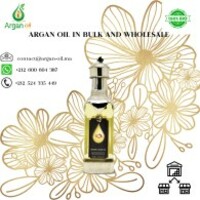Argan Oil in Bulk and Wholesale
Specifications
Argan Oil in Bulk and Wholesale Argan Oil In Bulk and Wholesale: Buying Argan Oil in Bulk: Tips for Sourcing High-Quality Wholesale Argan Oil Introduction Argan oil, also known as \"liquid gold,\" has gained immense popularity due to its multiple health and cosmetic benefits. Extracted from the native Moroccan argan tree, this versatile oil is utilized in the skincare, haircare, and culinary industries. As the global demand for argan oil continues to grow, the wholesale and bulk markets present profitable opportunities for businesses seeking to expand their reach and capitalize on this burgeoning trend. In this comprehensive guide, we will explore the intricacies of the wholesale and bulk argan oil markets, discuss their benefits and challenges, and provide tips for success in these dynamic markets. 1. Understanding the Wholesale and Bulk Argan Oil Markets ● Market Overview The wholesale and bulk argan oil markets have experienced significant growth in recent years, driven by increased consumer interest in natural, organic, and eco-friendly products. As the benefits of argan oil become more widely recognized, businesses across various sectors, including cosmetics, skincare, haircare, and culinary, are seeking to incorporate argan oil into their product offerings. ● Major Market Players The wholesale and bulk argan oil markets are characterized by a mix of producers, exporters, and wholesalers, each with a unique role in the supply chain. Producers are responsible for extracting and producing the oil, while exporters and wholesalers focus on distributing the oil to businesses and retailers worldwide. 2. Benefits and Challenges of Wholesale and Bulk Argan Oil Sales ● Benefits Engaging in wholesale and bulk sales allows businesses to take advantage of economies of scale, resulting in lower per-unit costs and increased profit margins. Moreover, the growing global demand for argan oil offers a lucrative opportunity for businesses to tap into an expanding market and reach a wider range of potential customers. In addition to this, wholesale and bulk sales often involve fewer transactions and simplified logistics, streamlining the sales process. Furthermore, Argan oil production plays a crucial role in supporting local Moroccan communities, particularly women who traditionally perform the labor-intensive extraction process, while also contributing to environmental conservation and combating desertification in the region. These positive social and environmental impacts can provide an added advantage to businesses engaging in wholesale and bulk sales of Argan oil. ● Challenges When selling argan oil wholesale and in bulk, businesses must comply with various international regulations, certifications, and quality standards, which can be complex and time-consuming. In addition to this, the growing demand for argan oil has led to increased competition, with many businesses entering the market. Moreover, the limited production of argan oil due to the slow-growing nature of the argan tree and the labor-intensive extraction process can create challenges in meeting the high demand. Therefore, businesses must navigate these challenges to succeed in the argan oil market. 3. Tips for Success in the Wholesale and Bulk Argan Oil Markets ● Source High-Quality Argan Oil Ensure that you are sourcing high-quality, pure argan oil from reliable suppliers. This practice is crucial for establishing a reputation for excellence in the global market. Look for suppliers that adhere to fair trade practices and support local communities. ● Obtain Relevant Certifications and Permits Obtain the necessary certifications and permits to comply with international standards and regulations. These may include organic certification, FDA approval, and compliance with EU cosmetic regulations, among others. ● Develop Effective Packaging and Storage Solutions Proper packaging and storage solutions are essential for maintaining the quality and freshness of wholesale and bulk argan oil. Invest in durable, airtight containers and store the oil in a cool, dark environment to preserve its nutrient content.
- Country: Morocco
- Business Type: Manufacturer
- Market: Americas,Africa,Asia,Middle East
- Founded Year: 2010
- Address: N°200 Lot Elmassar,Sidi Ghanem Industrial Estate
- Contact: Argan oil morocco






